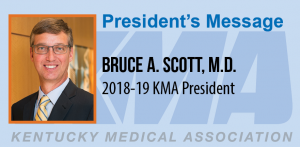Posted April 25, 2019
 During his testimony before the Kentucky Legislature a few weeks ago, Dr. Mike Kalfas, a family medicine physician, recalled seeing a young man on a Friday afternoon who was suffering from opioid addiction and writing a prescription for buprenorphine to help block the opioid cravings of his patient. After his office closed, the insurance company denied the medication because it required prior authorization. When Dr. Kalfas returned to his office on Monday morning, he learned that the insurance company had denied the medication so he completed the required paperwork and the health plan approved the medication. When the office staff called to notify the patient, they learned that the young man had died from an apparent overdose.
During his testimony before the Kentucky Legislature a few weeks ago, Dr. Mike Kalfas, a family medicine physician, recalled seeing a young man on a Friday afternoon who was suffering from opioid addiction and writing a prescription for buprenorphine to help block the opioid cravings of his patient. After his office closed, the insurance company denied the medication because it required prior authorization. When Dr. Kalfas returned to his office on Monday morning, he learned that the insurance company had denied the medication so he completed the required paperwork and the health plan approved the medication. When the office staff called to notify the patient, they learned that the young man had died from an apparent overdose.
Prior authorization results in delayed care and potentially harms patients. Nowhere is this more true than at the critical moment when a patient seeks treatment for addiction and their survival is jeopardized by any delay. House Bill (HB) 121, sponsored by Representative Kim Moser, would have prohibited health plans from requiring prior authorization for medication assisted treatment of addiction (MAT).
Concerns regarding MAT have been expressed by policy makers and some physicians, yet MAT has proven safe and effective in treating opioid use disorder. In 2015, the Kentucky Board of Medical Licensure (KBML) enacted one of the nation’s first and toughest set of regulations regarding the prescribing and dispensing of buprenorphine mono-product and buprenorphine-naloxone combination product, two medications that are frequently used in MAT. Specifically, the KBML rules, which have the full effect of law, established detailed professional standards and specifications that physicians must follow when treating opioid use disorder with these medications.
Unfortunately, despite a strongly worded letter from the Executive Vice President of the American Medical Association, Dr. James Madara, encouraging the Kentucky Association of Health Plans (KAHP) to engage in constructive dialogue regarding HB121, KAHP and its member organizations opposed HB121 and it failed to pass this legislative session.
While, over the last few years the Kentucky General Assembly has adopted meaningful legislation to help address the opioid crisis in our state, they missed an opportunity to take another important step forward when they did not pass HB121. A growing number of states have passed regulations increasing access to evidence-based care for patients with an opioid use disorder. In the words of Alex M. Axar II, Secretary U.S. Department of Health and Human Services, “we continue to see other states and commercial markets still supporting prior authorization—a practice that serves only to delay and deny treatment. As we know from our patients, delayed treatment can have deadly consequences.1”
It has been estimated that the opioid crisis costs the US over $500 billion per year1 and that does not begin to tally the human costs. According to the Centers for Disease Control and Prevention, every day, more than 130 people in the United States die from an opioid-related overdose. Kentucky overdose deaths are double the national average. Recognizing the epidemic that is upon us, the federal government recently awarded an $87 million grant to the University of Kentucky, the University’s largest grant ever, to help in the fight against substance use disorder. Other groups across the state have also received funding to help fight this epidemic, but there is more to be done.
Reversing the epidemic means that patients who need treatment can access it without delay and are not handcuffed by health insurance company paperwork. According to the most recent data2, 89 percent of those needing addiction treatment in our state aren’t currently receiving it. If a patient is lucky enough to have an addiction medicine physician what a shame if their care is denied or delayed by one of KAHP’s member health plans.
Dr. Kalas’ story had a tragic ending that was avoidable. Medication-Assisted Treatment (MAT), which combines evidence-based medication with mental health and social supports, has been called the “gold standard” by the U.S. Surgeon General and should be part of the solution for combating this issue in Kentucky.
- Facing Addiction in America: The Surgeon General’s Report on Alcohol, Drugs, and Health, please visit https://addiction.surgeongeneral. gov
- https://opioid.amfar.org/indicator/pctunmetneed

